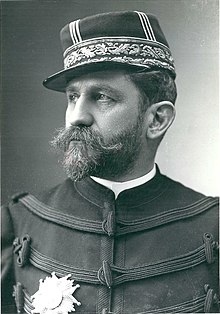Boulangisme
|
General Georges Boulanger |
|
|---|---|

Boulanger, photographed by Nadar
|
|
| Minister of War | |
|
In office 7 January 1886 – 31 May 1887 |
|
| Prime Minister | Charles de Freycinet |
| Preceded by | Charles de Freycinet |
| Succeeded by | Théophile Ferron |
| Member of the French Assembly | |
|
In office 1 August 1888 – 4 April 1889 |
|
| Constituency | Nord |
| Personal details | |
| Born |
29 April 1837 Rennes, Ille-et-Vilaine, France |
| Died | 30 September 1891 (aged 54) Brussels, Belgium |
| Resting place | Ixelles Cemetery, Brussels, Belgium |
| Nationality | French |
| Political party | League of Patriots |
| Spouse(s) | Lucie Renouard (m. 1864–91); his death |
| Children |
|
| Alma mater | École spéciale militaire de Saint-Cyr |
| Profession | Soldier |
| Signature | |
| Military service | |
| Nickname(s) | "Général Revanche" |
| Service/branch |
|
| Years of service | Active: 1856–1887 |
| Rank |
Inspector general Lieutenant colonel Brigadier general |
| Unit | 114th infantry regiment |
| Battles/wars | |
Georges Ernest Jean-Marie Boulanger (29 April 1837 – 30 September 1891), nicknamed Général Revanche, was a French general and politician. An enormously popular public figure during the Third Republic, he won a series of elections and was feared to be powerful enough to establish himself as dictator at the apogee of his popularity in January 1889. His base of support was the working districts of Paris and other cities, plus rural traditionalist Catholics and royalists. He promoted an aggressive nationalism, known as Revanchism, which opposed Germany and called for the defeat of the Franco-Prussian War (1870-71) to be avenged.
The elections of September 1889 marked a decisive defeat for the Boulangists. Changes in the electoral laws prevented Boulanger from running in multiple constituencies and the aggressive opposition of the established government, combined with Boulanger's self-imposed exile, all contributed to a rapid decline of the movement. The decline of Boulanger severely undermined the political strength of the conservative and royalist elements of French political life; they would not recover strength until the establishment of the Vichy regime in 1940. The defeat of the Boulangists ushered in a period of political dominance by the Opportunist Republicans.
Academics have attributed the failure of the movement to Boulanger's own weaknesses. Despite his charisma, he lacked coolness, consistency, and decisiveness; he was a mediocre leader who lacked vision and courage. He was never able to unite the disparate elements, ranging from the far left to the far right, that formed the base of his support. He was able, however, to frighten Republicans and force them to reorganize and strengthen their solidarity in opposition to him.
Born in Rennes, Boulanger graduated from Saint-Cyr and entered regular service in the French Army in 1856. He fought in the Austro-Sardinian War (he was wounded at Robecchetto con Induno, where he received the Légion d'honneur), and in the occupation of Cochin China, after which he became a captain and instructor at Saint-Cyr. During the Franco-Prussian War, Georges Boulanger was noted for his bravery, and soon promoted to chef de bataillon; he was again wounded while fighting at Champigny-sur-Marne (during the Siege of Paris). Subsequently, Boulanger was among the Third Republic military leaders who crushed the Paris Commune in April–May 1871. He was wounded a third time as he led troops to the siege of the Panthéon, and was promoted commandeur of the Légion d'honneur by Patrice Mac-Mahon. However, he was soon demoted (as his position was considered provisional), and his resignation in protest was rejected.
...
Wikipedia
